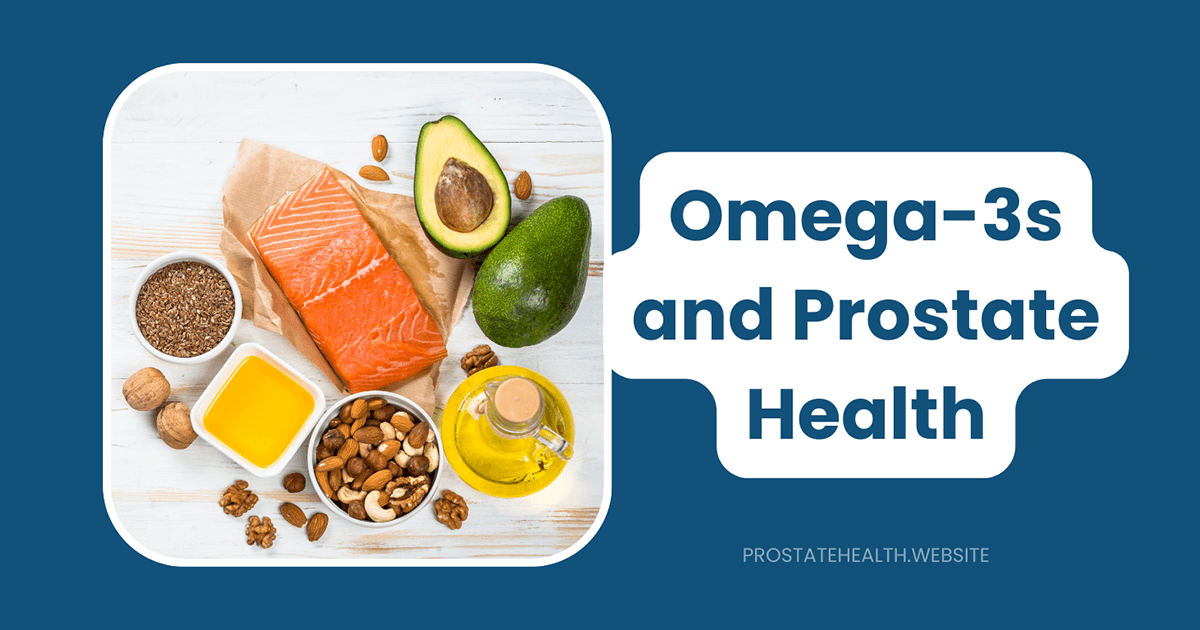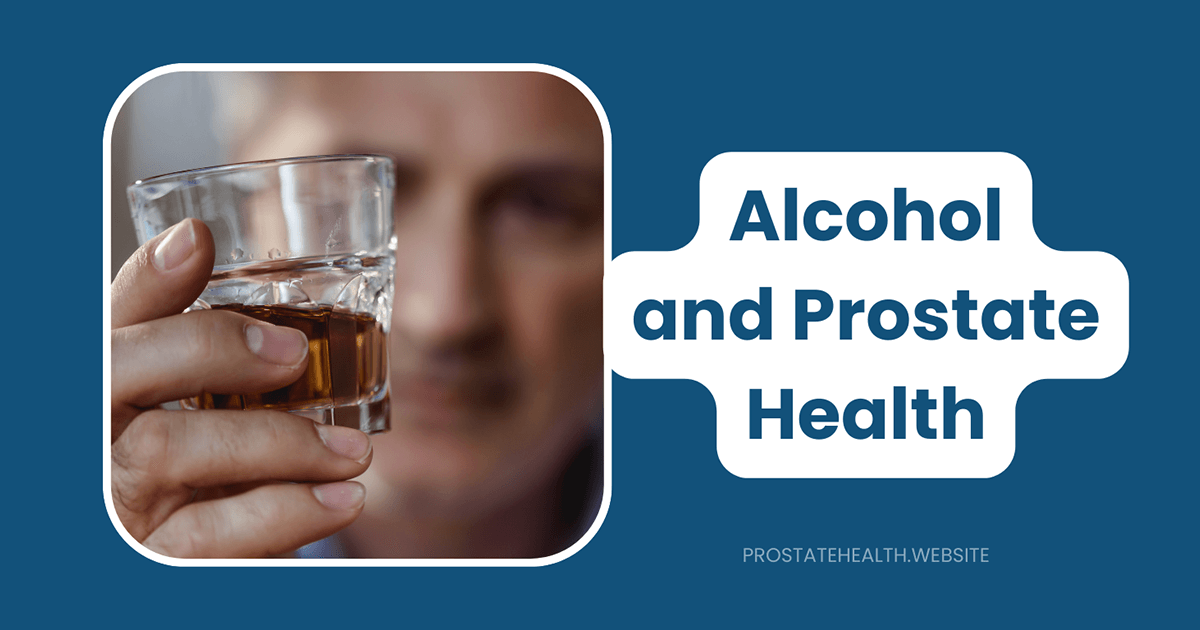The Role of Omega-3 Fatty Acids in Prostate Health

When Robert, a 58-year-old software engineer, received slightly elevated PSA results at his annual checkup, his first question wasn’t about medications or procedures. “What can I change in my diet?” he asked his urologist. The answer led him down a path of nutritional research, with omega-3 fatty acids quickly emerging as a topic of both promise and controversy.
Robert’s journey reflects a growing interest in the relationship between nutrition and prostate health. Among the various dietary components studied, omega-3 fatty acids have garnered particular attention for their potential role in supporting prostate health and possibly influencing prostate cancer risk.
But what does the science actually tell us? Are omega-3s beneficial for the prostate, harmful, or somewhere in between? This comprehensive guide explores the complex relationship between omega-3 fatty acids and prostate health, examining both the promising research and the ongoing controversies.
Understanding Omega-3 Fatty Acids
What Are Omega-3 Fatty Acids?
Omega-3 fatty acids are a group of polyunsaturated fats that are essential for human health but cannot be produced by the body. They must be obtained through diet or supplements.
The three primary types of omega-3 fatty acids are:
- Alpha-linolenic acid (ALA): A plant-based omega-3 found in flaxseeds, chia seeds, walnuts, and plant oils like canola and soybean oil.
- Eicosapentaenoic acid (EPA): Primarily found in fatty fish and fish oil, EPA has been studied for its anti-inflammatory properties.
- Docosahexaenoic acid (DHA): Also found in fatty fish and fish oil, DHA is a structural component of the brain, eyes, and many other body parts.
While ALA is considered essential (meaning our bodies cannot produce it), EPA and DHA can technically be synthesized from ALA in the body. However, this conversion is inefficient in humans, with only about 1-10% of ALA converting to EPA and 0.5-5% converting to DHA. This is why direct consumption of EPA and DHA through fish or supplements is often recommended.
Dietary Sources of Omega-3 Fatty Acids
Marine Sources (Rich in EPA and DHA)
- Fatty fish such as salmon, mackerel, sardines, and herring
- Fish oil supplements
- Algal oil (a plant-based source of DHA)
- Krill oil
Plant Sources (Primarily ALA)
- Flaxseeds and flaxseed oil
- Chia seeds
- Walnuts
- Hemp seeds
- Soybeans and soybean oil
- Canola oil
Dr. Michael Chen, nutritional biochemist at Pacific Health Institute, explains: “The type of omega-3 matters when we’re talking about health effects. EPA and DHA from marine sources have different biological activities compared to ALA from plant sources, and this distinction becomes particularly important when discussing prostate health.”
The Omega-3 and Prostate Health Connection
Potential Benefits for Prostate Health
Several mechanisms have been proposed for how omega-3 fatty acids might benefit prostate health:
1. Anti-inflammatory Effects
Inflammation plays a role in the development and progression of various prostate conditions, including prostatitis and potentially prostate cancer.
EPA and DHA can be converted into compounds called resolvins and protectins, which help resolve inflammation. By reducing chronic inflammation, omega-3s may help maintain prostate health.
2. Modulation of Cell Growth and Differentiation
Research suggests that omega-3 fatty acids may influence cell signaling pathways that control cell growth, potentially helping to prevent the uncontrolled cell proliferation characteristic of cancer.
A 2025 study published in the Journal of Clinical Oncology found that men with early-stage prostate cancer who followed a high omega-3, low omega-6 diet with fish oil supplements experienced a 15% decrease in Ki-67, a marker of cancer cell proliferation, while the control group saw a 24% increase.
3. Influence on Hormone Levels
Some research indicates that omega-3 fatty acids may affect the metabolism of sex hormones, including testosterone and estrogen, which play roles in prostate growth and cancer development.
4. Reduction of Oxidative Stress
Omega-3s may help combat oxidative stress, a process that can damage cells and DNA, potentially contributing to cancer development.
Research on Omega-3s and Prostate Conditions
Benign Prostatic Hyperplasia (BPH)
Limited research has examined the relationship between omega-3 fatty acids and BPH (enlarged prostate). Some studies suggest that the anti-inflammatory properties of omega-3s might help reduce prostate inflammation and potentially slow prostate growth.
A small study published in the British Journal of Nutrition found that men who consumed more EPA and DHA had lower rates of BPH, though more research is needed to confirm this association.
Prostatitis
The anti-inflammatory effects of omega-3 fatty acids may be beneficial for men with prostatitis, a condition characterized by inflammation of the prostate gland.
Dr. Sarah Johnson, urologist at Memorial Urology Center, notes: “While we don’t have definitive clinical trials showing omega-3 supplements cure prostatitis, the anti-inflammatory mechanism makes theoretical sense, and some of my patients report improvement in symptoms with regular consumption of fatty fish or fish oil supplements.”
Prostate Cancer: A Complex Picture
The relationship between omega-3 fatty acids and prostate cancer is where the controversy begins. Research has yielded mixed and sometimes contradictory results.
Studies Suggesting Protective Effects
Several studies have indicated potential protective effects of omega-3 fatty acids against prostate cancer:
- The Health Professionals Follow-up Study found that men with higher EPA and DHA intake had a lower likelihood of developing advanced prostate cancer.
- A 2025 UCLA study found that men with early-stage prostate cancer who followed a diet high in omega-3s and low in omega-6s, combined with fish oil supplements, experienced a significant reduction in cancer cell proliferation compared to the control group.
- Population studies have noted that Japanese men, who typically consume more fish and have higher omega-3 levels, have lower prostate cancer mortality rates compared to Western populations.
Studies Suggesting Potential Risks
Conversely, some research has raised concerns:
- A 2013 study published in the Journal of the National Cancer Institute suggested a link between high blood levels of omega-3 fatty acids and increased prostate cancer risk, particularly for aggressive forms of the disease.
- Some studies have found associations between high ALA intake and increased prostate cancer risk, though this relationship has been inconsistent and may be influenced by how the ALA is processed or consumed.
Resolving the Contradictions
How can we make sense of these seemingly contradictory findings? Several factors may explain the discrepancies:
- Different types of omega-3s: The effects of ALA (plant-based) may differ from those of EPA and DHA (marine-based).
- Study methodology: Blood measurements of omega-3s capture a snapshot in time and may not reflect long-term dietary patterns.
- Confounding factors: Fish consumers may have other healthy habits that influence cancer risk.
- Genetic variations: Individual genetic differences may influence how omega-3s affect prostate cells.
- Balance with omega-6 fatty acids: The ratio of omega-6 to omega-3 fatty acids may be more important than absolute omega-3 levels.
Dr. Robert Thompson, oncologist specializing in genitourinary cancers, explains: “The relationship between omega-3s and prostate cancer is nuanced. The most recent and well-designed studies suggest that marine omega-3s, particularly when balanced with lower omega-6 intake, may be beneficial rather than harmful. But individual factors, including genetics and overall diet quality, likely play important roles.”
Practical Recommendations for Omega-3 Consumption
General Guidelines for Prostate Health
Based on current evidence, here are practical recommendations for incorporating omega-3 fatty acids into a prostate-healthy diet:
1. Focus on Food First
- Aim to consume fatty fish like salmon, mackerel, sardines, or herring 2-3 times per week
- Include plant-based sources of ALA such as ground flaxseeds, chia seeds, and walnuts regularly
- Use oils rich in ALA (like flaxseed oil) for cold applications like salad dressings
2. Consider the Omega-6 to Omega-3 Ratio
The typical Western diet contains an abundance of omega-6 fatty acids (found in vegetable oils, processed foods, and many snacks) and relatively few omega-3s. This imbalance may contribute to inflammation and other health issues.
Steps to improve your ratio:
- Reduce consumption of processed foods high in omega-6 fatty acids
- Limit use of oils high in omega-6s (corn, safflower, sunflower)
- Increase omega-3 intake through the sources mentioned above
- Consider using olive oil as your primary cooking oil, as it’s lower in omega-6 than many other vegetable oils
3. Supplement Wisely
For those who don’t regularly consume fatty fish, supplements may be an option:
- Fish oil supplements typically provide a combination of EPA and DHA
- Algal oil supplements offer a plant-based alternative for vegetarians and vegans
- Krill oil provides omega-3s in a different form that some research suggests may be better absorbed
If considering supplements, keep these points in mind:
- Consult with your healthcare provider before starting any supplement
- Choose reputable brands that test for contaminants like mercury and PCBs
- Store supplements properly (usually refrigerated after opening) to prevent rancidity
- Start with lower doses to minimize potential side effects like fishy aftertaste or digestive discomfort
Special Considerations for Different Prostate Conditions
For Men with Healthy Prostates (Prevention)
- Focus on overall dietary patterns rather than single nutrients
- Include omega-3-rich foods as part of a balanced diet with plenty of fruits, vegetables, and whole grains
- Maintain a healthy weight and exercise regularly, as these factors also influence prostate health
For Men with BPH
- The anti-inflammatory effects of omega-3s may be beneficial
- Consider including both food sources and possibly supplements after consulting with your healthcare provider
- Monitor symptoms to see if dietary changes appear to help
For Men with Prostatitis
- The anti-inflammatory properties of omega-3s may help manage symptoms
- Higher doses of EPA and DHA (under medical supervision) might be more effective for reducing inflammation
- Combine with other anti-inflammatory foods like turmeric, ginger, and berries
For Men with Prostate Cancer or Elevated Risk
This is where personalized medical advice becomes most important:
- Discuss omega-3 consumption with your oncologist or urologist
- Consider the latest research, including the promising 2025 studies on omega-3/omega-6 ratio
- If pursuing active surveillance, the high omega-3, low omega-6 approach with medical supervision may be worth discussing with your healthcare team
Beyond Omega-3s: The Bigger Picture of Diet and Prostate Health
While omega-3 fatty acids are important, they’re just one component of a prostate-healthy diet. For optimal prostate health, consider these additional dietary factors:
Mediterranean Diet Pattern
Research consistently shows that a Mediterranean-style eating pattern benefits prostate health. This diet emphasizes:
- Abundant fruits and vegetables
- Whole grains
- Olive oil as the primary fat
- Moderate fish consumption
- Limited red meat
- Moderate wine consumption (if alcohol is consumed)
Tomatoes and Lycopene
Tomatoes contain lycopene, a powerful antioxidant that has been associated with reduced prostate cancer risk in some studies. Cooked tomato products (like tomato sauce) provide more bioavailable lycopene than raw tomatoes.
Cruciferous Vegetables
Broccoli, cauliflower, Brussels sprouts, and other cruciferous vegetables contain compounds that may help protect against prostate cancer.
Green Tea
Some research suggests that green tea catechins may benefit prostate health, though more studies are needed.
Limited Processed Foods
Highly processed foods often contain unhealthy fats, excessive sodium, and other compounds that may negatively affect prostate and overall health.
Real-World Success: Patient Experiences
James, a 62-year-old retired teacher diagnosed with early-stage prostate cancer, opted for active surveillance and dietary changes rather than immediate treatment. “My urologist mentioned the UCLA study on omega-3s, and I decided to give it a try. I eat salmon twice a week now, take a high-quality fish oil supplement, and have cut way back on processed foods. At my six-month follow-up, my PSA had stabilized, and I feel better overall.”
While individual experiences vary and James’s story doesn’t prove causation, many men report improvements in prostate health markers after adopting diets rich in omega-3 fatty acids and other nutrients that support prostate health.
Potential Risks and Side Effects
While omega-3 fatty acids offer many potential benefits, they’re not without possible downsides:
Common Side Effects of Supplements
- Fishy aftertaste or burping
- Digestive discomfort
- Loose stools at high doses
Medication Interactions
Omega-3 supplements may interact with:
- Blood thinners like warfarin
- Blood pressure medications
- Some anti-inflammatory drugs
Quality Concerns
Some fish oil supplements may contain contaminants or oxidized oils if not properly manufactured or stored.
Allergic Reactions
People with fish or shellfish allergies should be cautious with marine-based omega-3 supplements.
Future Directions in Research
The field of omega-3 research continues to evolve, with several exciting directions:
- Personalized recommendations: Research is exploring how genetic factors might influence individual responses to omega-3 fatty acids.
- Optimal ratios: Further studies are investigating the ideal balance between different types of fatty acids for prostate health.
- Combination approaches: Researchers are examining how omega-3s work in conjunction with other nutrients and lifestyle factors to influence prostate health.
- Mechanism studies: Scientists are working to better understand exactly how omega-3s affect prostate cells at the molecular level.
- Larger clinical trials: The promising results from the 2025 UCLA study are likely to spur larger, longer-term trials to confirm the benefits of omega-3-rich diets for men with prostate cancer.
Conclusion: Balancing the Evidence
The relationship between omega-3 fatty acids and prostate health is complex and still evolving. While some controversies remain, the weight of recent evidence suggests that:
- Marine-based omega-3s (EPA and DHA) likely offer benefits for prostate health when consumed as part of a balanced diet.
- The ratio of omega-6 to omega-3 fatty acids may be more important than absolute omega-3 intake.
- Individual factors, including genetics, overall diet quality, and specific prostate conditions, influence how omega-3s affect prostate health.
- A holistic approach that includes omega-3-rich foods as part of an overall healthy dietary pattern, regular exercise, and appropriate medical monitoring offers the best strategy for supporting prostate health.
Remember Robert from the beginning of our article? After discussing the evidence with his urologist, he decided to increase his consumption of fatty fish to twice weekly and reduce his intake of processed foods high in omega-6 fatty acids. Six months later, his PSA had decreased slightly, and he reported feeling better overall. “I can’t say for sure it was the omega-3s,” he acknowledges, “but making these dietary changes has improved my health in many ways, so I’m sticking with it.”
As with any nutritional approach to health, the key is consistency, moderation, and working with healthcare providers to develop a plan tailored to your individual needs and medical situation.
Additional Resources:






